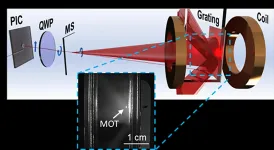(Press-News.org) The results of a randomised clinical trial with the longest follow up to date show that metabolic surgery is more effective than medications and lifestyle interventions in the long-term control of severe type 2 diabetes.
The study, published today in The Lancet, also shows that over one-third of surgically-treated patients remained diabetes-free throughout the 10-year period of the trial. This demonstrates, in the context of the most rigorous type of clinical investigation, that a "cure" for type 2 diabetes can be achieved.
Researchers from King's College London and the Fondazione Policlinico Universitario Agostino Gemelli IRCCS, Rome, Italy report the 10-year outcomes of a trial that compared metabolic surgery with conventional medical and lifestyle interventions in patients with type 2 diabetes.
The study involved 60 patients with advanced type 2 diabetes and treated at a major academic hospital in Rome, Italy. The patients randomly underwent drugs plus lifestyle interventions or metabolic surgery (gastric bypass or biliopancreatic diversion). At the start of the study, all patients had severe disease, with poorly controlled blood sugar levels and more than five years history of diabetes.
The results of the study show that 37.5% of surgically-treated patients were able to maintain non-diabetic glycaemia without need for diabetes medication - a condition referred to as diabetes remission - for the duration of the 10-year study period. In 2009, American Diabetes Association defined "cure" of diabetes as a continued state of disease remission for more than five years.
Professor Francesco Rubino, senior author of the report and Chair of Bariatric and Metabolic Surgery at King's College London and a consultant surgeon at King's College Hospital in London said: "The findings from this study provide the most robust scientific evidence yet that full-blown type 2 diabetes is a curable disease, not inevitably progressive and irreversible. In addition to represent a major advance in the treatment of diabetes, metabolic surgery is our best lead to the elusive cause of the disease".
Compared to conventional medical treatment, surgery also resulted in better overall metabolic control, lower cardiovascular risk, better kidney function and quality of life. Notably, patients treated surgically had a significant lower incidence of diabetes-related complications, including cardiac, renal, and neurological adverse events. Metabolic surgery also reduced medication usage, including drugs for diabetes, high blood pressure and dyslipidaemia.
The study investigated the early and long-term safety of the different intervention strategies. Patients who underwent biliopancreatic diversion had more incidences of serious adverse events, including events associated to both disease and intervention, compared to subjects in both other groups. Patients treated by conventional medical therapy had significantly higher incidence of serious adverse events compared to patients who underwent surgery by Roux-en-Y gastric bypass.
Professor Geltrude Mingrone, first author of the report, Professor of Medicine at the Catholic University of Rome and a Professor of Diabetes and Nutrition at King's College London said: "These data corroborate the notion that surgery can be a cost-effective approach to treating type 2 diabetes. The evidence is now more than compelling that metabolic surgery should be considered as a main therapeutic option for the treatment of patients with severe type 2 diabetes and obesity."
Previous studies had shown that bariatric or weight loss surgery can induce long-term remission of diabetes in patients with very severe obesity; however, most patients who undergo traditional weight loss surgery have typically mild or recent-onset diabetes. This trial shows the potential curative effect of metabolic surgery for patients with severe disease.
Diabetes is one of the leading causes of mortality and morbidity in Western societies and significantly increases the risk of severe COVID-19 and mortality from the virus. Despite the evidence that surgery can rapidly and dramatically improve diabetes, less than 1% of surgical candidates have access to metabolic surgery in most countries. Furthermore, metabolic surgery operations have been suspended for even longer than other elective surgical procedures during the current pandemic.
Professor Rubino added: "Metabolic surgery is arguably the most effective available therapy for type 2 diabetes and can be a life-saving option for many patients. It should be appropriately prioritized in times of pandemic and beyond."
INFORMATION:
Food insecurity spiked among residents living in two predominantly African American neighborhoods during the first weeks of the coronavirus pandemic, far outpacing food insecurity observed among the general U.S. population during the same period, according to a new RAND Corporation study.
Following residents of two Pittsburgh low-income African American neighborhoods characterized as food deserts since 2011, the study found that the pandemic increased the number of people facing food insecurity by nearly 80%.
Similar to United States national trends, food insecurity among residents had been improving consistently since 2011. ...
When drought caused devastating crop losses in Malawi in 2015-2016, farmers in the southeastern African nation did not initially fear for the worst: the government had purchased insurance for such a calamity. But millions of farmers remained unpaid for months because the insurer's model failed to detect the extent of the losses, and a subsequent model audit moved slowly. Quicker payments would have greatly reduced the shockwaves that rippled across the landlocked country.
While the insurers fixed the issues resulting in that error, the incident remains a cautionary tale about the potential failures of agricultural ...
It's cool to be small. Scientists at the National Institute of Standards and Technology (NIST) have miniaturized the optical components required to cool atoms down to a few thousandths of a degree above absolute zero, the first step in employing them on microchips to drive a new generation of super-accurate atomic clocks, enable navigation without GPS, and simulate quantum systems.
Cooling atoms is equivalent to slowing them down, which makes them a lot easier to study. At room temperature, atoms whiz through the air at nearly the speed of sound, some 343 meters per second. The rapid, randomly moving atoms have only fleeting interactions ...
Black women have higher recurrence and mortality rates than non-Hispanic white women for certain types of breast cancer, according to a University of Illinois Chicago researcher's study published recently in JAMA Oncology.
Dr. Kent Hoskins, associate professor in the UIC College of Medicine's division of hematology/oncology, and co-leader of the Breast Cancer Research group in the University of Illinois Cancer Center, published the study, "Association of race/ethnicity and the 21-gene Recurrence Score with breast cancer-specific mortality among US women" in the Jan. 21 online issue.
Hoskins and the research team sought to discover if breast cancer-specific mortality among women with estrogen ...
Simon Fraser University researchers have found evidence that large ambush-predatory worms--some as long as two metres--roamed the ocean floor near Taiwan over 20 million years ago. The finding, published today in the journal Scientific Reports, is the result of reconstructing an unusual trace fossil that they identified as a burrow of these ancient worms.
According to the study's lead author, SFU Earth Sciences PhD student, Yu-Yen Pan, the trace fossil was found in a rocky area near coastal Taiwan. Trace fossils are part of a research field known as ichnology. "I was fascinated by this monster burrow at first glance," she says. "Compared to other trace fossils which are usually only a few tens of centimetres ...
A new collaborative study from researchers at the Geisel School of Medicine at Dartmouth and the University of Washington (UW) and published in the Proceedings of the National Academy of Sciences (PNAS), reveals unexpected insights into how skin exposure to ultraviolet (UV) light can worsen clinical symptoms in autoimmune diseases such as lupus.
Lupus, an autoimmune disease that can cause inflammation of the joints, skin, kidneys, blood cells, brain, heart and lungs, is caused when the immune system attacks its own tissue.
Previous research has established that in up to 80 percent of lupus patients, sunlight exposure can trigger both local skin inflammation and systemic flares, including kidney disease. But little has been understood about the underlying mechanisms that drive this process. ...
Doctors may be able to predict their patients' risks of fatal coronary heart disease more accurately by taking into account the number of adverse social factors affecting them, according to a new study led by researchers at Weill Cornell Medicine and NewYork-Presbyterian.
The researchers, whose findings appear Dec. 3 in Circulation, analyzed data from the Reasons for Geographic and Racial Differences in Stroke (REGARDS) Study that tracked cardiovascular-related health outcomes in more than 20,000 people for a decade. The new analysis showed that participants who had more adverse social determinants ...
The SARS-CoV-2 virus may enter and replicate in human cells by exploiting newly-identified sequences within cell receptors, according to work from two teams of scientists. The findings from both groups paint a more complete portrait of the various cellular processes that SARS-CoV-2 targets to not only enter cells, but to then multiply and spread. The results also hint that the sequences could potentially serve as targets for new therapies for patients with COVID-19, although validation in cells and animal models is needed. Scientists know that SARS-CoV-2 binds the ACE2 receptor on the surface of human cells, after which it enters the cell through a process known as endocytosis. Research has suggested that the virus may hijack or interfere with other processes such as cellular housekeeping ...
Chimeric Antigen Receptor T-cell therapy--CAR T--has revolutionized leukemia treatment. Unfortunately, the therapy has not been effective for treating solid tumors including childhood cancers such as neuroblastoma. Preclinical studies using certain CAR T against neuroblastoma revealed toxic effects. Now, a group of scientists at Children's Hospital Los Angeles have developed a modified version of CAR T that shows promise in targeting neuroblastoma, spares healthy brain tissue and more effectively kills cancer cells. Their study was published today in END ...
Astronomers at the Center for Astrophysics | Harvard & Smithsonian have detected the first Jupiter-like planet without clouds or haze in its observable atmosphere. The END ...



